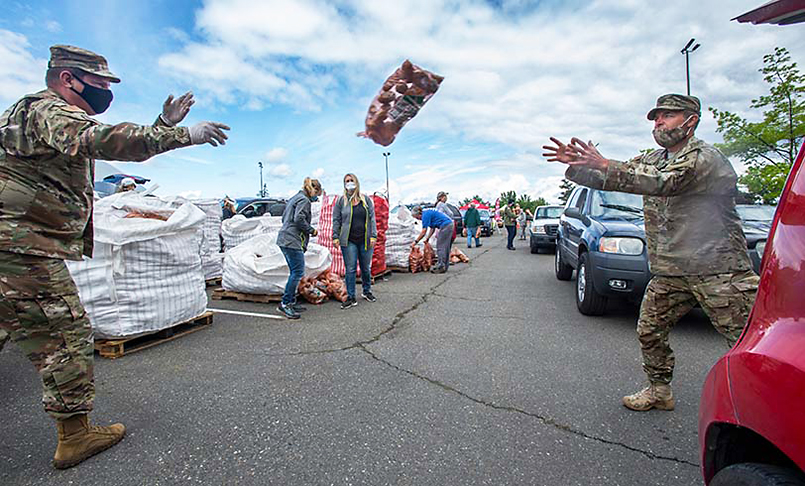
The only way to make significant reductions in food waste is by working together. A successful example of food redistribution partnerships was the effort to save Washington-grown potatoes. Pictured, a Washington National Guard troops help deliver potatoes at the Tacoma Dome in May 2020, during the onset of the COVID-19 pandemic. Photo by Drew Perine, The News Tribune (used with permission)
Food plays an important role in the lives of everyone in Washington. As many of us have grown detached from how it is produced, distributed and disposed, it’s easy to overlook misuse of food resources, which is why a lot of food is wasted — one-third of it to be exact. Reducing food waste is an effort we can all get behind, and Ecology has developed a statewide plan to cut it in half by 2030.
Use food well, Washington!
The Use Food Well Washington Plan (UFWW Plan) outlines a pathway to a more resilient food system through food waste reduction. It provides 30 recommendations policymakers and others can use to reduce food waste across all sectors of the food system. We drafted the plan after consulting with the Washington departments of Agriculture, Health, Commerce, the Office of Superintendent of Public Instruction, and more than 100 experts.
The UFWW Plan can help create a more resilient food system by focusing on federal and state policy, funding, public education, and infrastructure development. It prioritizes public-private partnerships over regulations, and emphasizes the importance of data-driven decisions.
These recommendations will also help Washington meet its 2030 food waste reduction goals set by the Washington Legislature: reduce food waste generation by 579,373 tons, including at least 195,032 tons of edible food waste.
Reducing food waste is important
Washington generates about 1.2 million tons of food waste annually. More than 390,000 tons of that is edible food waste. No other single resource is dumped in landfills across the United States more than food, and it has significant environmental, social, and economic impacts. Food waste is expensive and a misuse of resources.
The Washington Department of Agriculture estimates that every year one in six people in the state receives food from emergency food providers. And that number has grown since the start of the COVID-19 pandemic.
Food waste reduction: challenges and solutions
Funding is the largest barrier to food waste reduction across most sectors, especially in the areas of hunger relief, food businesses, and local governments. Increasing investments in public education and infrastructure will be needed, in addition to a coordinated effort to change federal and state policy.
Comprehensive implementation of the plan’s 30 recommendations has the potential for annual net benefits in excess of $1 billion by reducing disposal costs, developing new markets and uses for waste, and avoiding unnecessary food purchases. Washington would also avoid over $150 million in climate change impacts stemming from greenhouse gas emissions that would otherwise come from food waste.
No single solution exists to meet the 2030 goals. This is why comprehensive implementation of the plan is essential. The plan creates an over-arching strategy of interconnected recommendations that rely on each other to succeed.
The UFWW Plan is available to everyone. The plan will be especially useful to those working in the areas of hunger relief, food businesses, and local governments.
Register for March 2 webinar
Visit our website to learn more, or register for an upcoming webinar on March 2, 2022. It begins at 10 a.m. Those interested in how the UFWW Plan was developed, its economic analysis, and the steps Washington needs to take to meet the 2030 food waste reduction goals are encouraged to attend.

